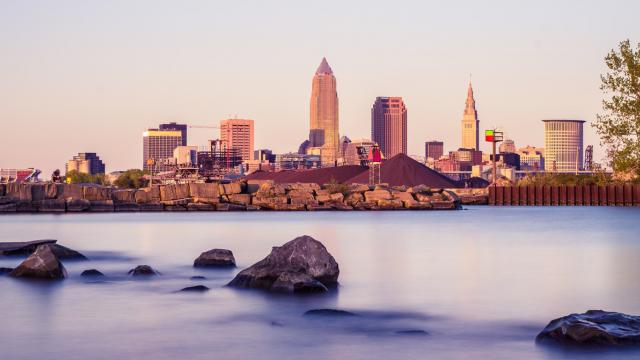
"Water is a very good servant, but it is a cruell maister." - William Bullein (1562)
A game you could play with this article would be to substitute the word “air” every time you read “water.” Commodification of water seems silly enough in the abstract. Now in the throes of artificial scarcity, U.S. cities, counties and states are running out of water even as they turn control over managing water supplies to private corporations.
At the beginning of February, as chronicled by Victoria Collier, New Jersey authorized the fast-track sale and leasing of water utilities to private corporations “without public notice, comment, or approval.” As I write this, more communities in New Jersey are “studying water privatization, while the city council of Columbia, South Carolina is resisting business interests’ pressure to privatize water there as well.
Last year, a private water utility in West Virginia poisoned the state, and afterwards fought against “disclosure of information about its preparedness for and response to a chemical spill that contaminated the drinking water for 300,000 people in its service area.”
Later in the year, Detroit, having sold its water to private corporations, and living under an unelected “Emergency Manager,” saw its water shut off at a rate of 3,000 families per week. Businesses were exempted from these shut-offs, and all the while, the white-owned downtown commercial center of the city basked in billions of dollars it had received in investments. Eventually, the United Nations condemned the shut-offs that deprived tens of thousands of water.
The UN took special note of “large-scale retrogression or backwards steps” in U.S. citizens’ access to water; observers were shocked to see scarcity where there had once been abundance and mass access. “From a human rights perspective,” one official said, “any retrogression should be seen as a human right violation.”
Thomas Stevens of Detroiters Resisting Emergency Management sees privatization-induced water retrogression as “the product of militant late corporate capitalism, racism and the unreasoning commodification of the means of life itself.” Victoria Collier writing for Truthout warns that “JP Morgan Chase, Goldman Sachs, Citigroup, the Carlyle Group, Allianz and many others are aggressively buying up the world’s declining fresh water supply and infrastructure in what is being called a ‘liquid gold rush.’”
Meanwhile, the southwestern quadrant of the United States is running out of water entirely.
Resource-Starved Governments Give Away the Commons
The water crisis has nothing to do with the actual availability of water. Instead, the culprit is local communities’ inability to control their wealth, their common resources, their institutions of lending and credit. The drive to privatize our water supplies, Collier points out, is a direct result of "the intentionally crippled tax base of American states... Cash-strapped governments can finally no longer repair crumbling infrastructure or meet future development needs. Offering to 'fill the budget gap,' the private sector is grabbing public assets and resources, particularly water, blinding public officials to the consequences of long-term contracts with substantial up-front payments."
Detroit’s elite-engineered bankruptcy provided a justification for its unelected emergency government to contract with a demolition and logistics company, Homrich, to shut off the water of any private resident (they exempted businesses) who were over 45 days late in full payment. Some of those who had their water shut off had been paying down their bills.
As Thomas Stevens of DREM explained: “Giant corporate contractors, from Infrastructure Management Group (IMG) thru EMA and now to Veolia have bit off more and more of the system and its lucrative contracting and community economic benefits and powers for decades.”
This kind of privatization results from local governments going broke – in debt to big banks, regulated by unfunded mandates from an aloof and cronyist federal government, unable to finance their own control over water, or raise the capital to design and implement their own sustainable water systems. Armed with arguments carefully constructed by pro-privatization think tanks, private sector lobbyists exploit the often-unquestioned rhetoric of “market correctness” to conclusively assert that privatization will be more efficient than public management.
In fact, privatized water systems are no more efficient than publicly run systems – a conclusion confirmed last May by Food & Water Watch, which cited extensive review of empirical studies and analysis based on transaction costs, efficiency, and political costs. Private corporations are not subject to state-level open records legislation. This was an issue, for example, in the discussion about the 2014 sale of Haddonfield, New Jersey's water and sewer systems, to New Jersey American Water, a subsidiary of the nation's largest private water utility corporation.
As private corporations, water utility companies are under no legal obligation to respond to data requests from consumers or safety and environmental advocates. As Food & Water Watch pointed out last year: “Water service is a natural monopoly. If the utility company increases rates dramatically or if service quickly deteriorates, a customer cannot simply select another provider without moving to another community.”
In contrast, when water is publicly-managed and democratically controlled, “consumers can exercise their power at the ballot box when elected officials oversee their utilities.”
For corporations performing in the service of their shareholders, profitability eclipses all other concerns. Private corporations weigh potential shortages, cut-offs and even contamination risks only in relation to their effect on profits. But profitability is not an appropriate criterion for deciding water rates, system improvements, or safety measures. Instead, we ought to view water as a common resource, subject to democratic self-management and diligent public monitoring of treatment and distribution.
Such a revolutionary approach to water policy requires strong and autonomous local communities, which in turn requires self-managed economies: public banks and local control of utilities, ideally within a framework of a democratic commons.
Water Justice Requires Economic Justice
Following Maude Barlow of On the Commons, water “belongs to everyone and to no one exclusively, and must be passed on to future generations in sufficient volume and quality.” Both watersheds and water itself should be treated as commons. Importantly, we should provide water to all “as a basic principle of justice, not as an act of charity.” Charity operates from and reinforces material hierarchy, while economic justice recognizes that there are some public goods to which everyone is entitled.
Many progressives laudably call for the formal, political recognition of water as a human right. This is necessary, but far from sufficient. There is a strong legal basis for extending the public trust doctrine to water access. Legal scholarship on public trust doctrinedemonstrates a sound basis for guarding against the “privatization of important public resources.” Some courts, such as Hawaii’s, even extend a “precautionary principle” to water management, including groundwater, “in order to encourage resource protection in the absence of conclusive scientific proof.” Courts in some other countries have more robust public trust doctrines. But legal recognitions only have teeth when accompanied by material control by the people.
Likewise, the promise of federal legislation is shaky and inconsistent. Until leaders from outside the corporate duopoly occupy national posts, we can expect little from the federal government in response to the seizure of public water and resulting environmental and humanitarian impacts. The Water Resources Reform and Development Act (WRRDA), signed by President Obama, expanded private financing of water projects.
In rejecting the corporatist myth that privatization facilitates efficient or just water distribution, we should not be blind to the role of “big government” water protection policies in forcing urban municipalities into desperation and consequently surrender to corporations. “Ever since the passage of the Clean Water Act in 1970, and the immense costs it imposed for protecting Great Lakes resources,” Thomas Stevens told me, “the increasingly isolated, wealthier and white supremacist suburbanized region has fought as much as possible to impose those costs on the City and the People of Detroit.” Federal mandates that rely on local resources make privatization seem very attractive, he added, because at present many state and local governments are in the red.
Nor do international institutions offer a solution to privatization in the U.S. Although United Nations officials visited Detroit and issued sobering proclamations, there was little they could actually do. The United States has traditionally taken the position that no “right to water” exists under international law. Current international institutions realistically can't pressure the United States to modify that position.
Instead of relying on federal or international monitoring, local communities need economic autonomy – the ability to create and nurture their own wealth – in order to exercise autonomy over their water and to sensibly plan the use and sharing of that water with other communities. As long as states and municipalities are held hostage to too-big-to-fail financiers, neoliberal-minded policymakers, and the illusion that privatization leads to fiscally and morally correct outcomes, our commons will continue to face depletion, and local officials will shift the consequences to their most vulnerable citizens. A public water commons requires a public economic commons.
Matt Stannard is policy director at Commonomics USA and a researcher at the Public Banking Institute.
3 WAYS TO SHOW YOUR SUPPORT
- Log in to post comments
















